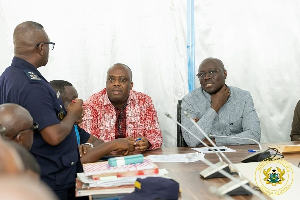Sunyani (B/A), May 2, GNA - Professor Kwabena Frimpong-Boateng, Director of the National Cardiothoracic Centre at the Korle Bu Teaching Hospital, on Friday said polytechnics in Ghana must be positioned for proper orientation to be able to meet technical, scientific and technological manpower needs of the country. He observed that the roles of polytechnics had not been properly defined because of the absence of credible national science and technology and industrial policy that would spell out the functions of various educational and research institutions, industries and the private sector.
Prof. Frimpong-Boateng was speaking at the launch of this year's Sunyani Polytechnic Student Representative Council (SRC)/Ghana National Union of Polytechnic Students (GNUPS) week, which was under the theme: "Technology and professionalism - the role of polytechnic education in national development", in Sunyani. He said Polytechnics in the country had certain unfortunate characteristics such as inadequate infrastructure and facilities for practical training in educational institutions, poor funding and lack of industries with opportunities for practical attachment, programmes not tailored to suit the needs of industries and general lack of orientation.
Prof. Frimpong-Boateng said "our Polytechnics have been given approval by the Ministry of Education to run Bachelor of Technology programmes to enable holders of the Higher National Diploma to undertake higher academic pursuits in other universities more readily". He described the situation as inconvenient because "it gives the impression that higher academic pursuits cannot be undertaken in Polytechnics and that academic pursuit is preferable to practical training or that the two cannot co-exist".
Prof. Frimpong-Boateng urged Polytechnics to ensure practical training for students and co-operate with industries to be able to provide higher academic pursuit to meet the needs of the labour market. He stressed that "Graduates of Polytechnics in countries with well-defined industrial policies and functioning industries easily find jobs." Prof. Frimpong-Boateng said the University of Mines in Tarkwa was a typical example of an institution that elsewhere would have been called a polytechnic or technical university tailored to develop the mining industry in Ghana, adding " The fact that it is called a university in Ghana does not make it superior to say the School of Mines in Paris". He called for resourcing of the Tarkwa University of Mines with the requisite modern state-of-the-art machinery and equipment to be able to design, develop and produce mining equipment and provide studies every thing about mining.
Prof. Frimpong-Boateng said if appropriate measures were put in place Ghana should be able to attain self-sufficiency in mining within 10 to 15 years to avoid the 100 per cent dependency on foreign expertise to move the mining industry forward.
General News of Saturday, 2 May 2009
Source: GNA












